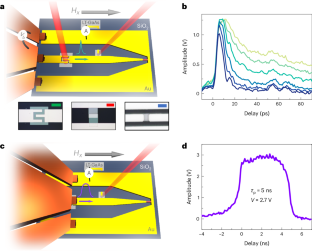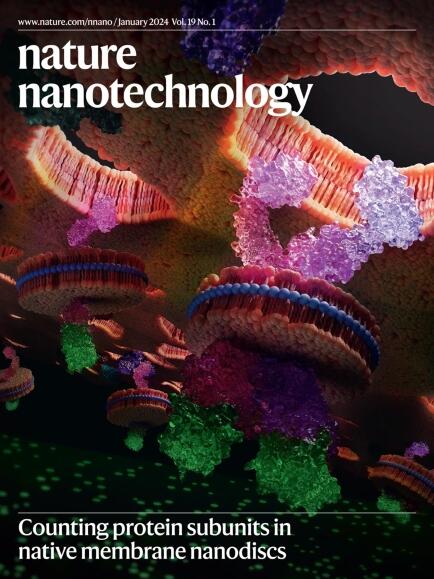铁磁性和铁磁性薄膜中的高能效皮秒自旋-轨道力矩磁化切换
IF 38.1
1区 材料科学
Q1 MATERIALS SCIENCE, MULTIDISCIPLINARY
引用次数: 0
摘要
电流脉冲可通过自旋轨道力矩有效操纵磁化。短至几皮秒的脉冲持续时间已被用于切换铁磁薄膜的磁化,达到太赫兹机制。然而,人们对超快切换机制中的逆转机制和能量要求知之甚少。在这项工作中,我们量化了铁磁性和铁磁性样品在脉冲持续时间超过七个数量级时磁化反转的能量成本,在准静态自旋电子学和飞磁之间架起了一座桥梁。为此,我们开发了一种方法,将光电导开关产生的皮秒脉冲拉伸一个数量级。这样,我们就能产生从皮秒到接近商用仪器脉冲宽度的电流脉冲。我们的研究表明,当脉冲持续时间进入皮秒范围时,自旋轨道转矩开关的能量成本在所有样品中都会降低一个数量级以上。我们预计 100 × 100 nm2 铁磁器件的能量成本为 9 fJ。微磁和宏旋模拟揭示了从非相干磁化反转到相干磁化反转的过渡,随着脉冲持续时间的缩短,磁化动态轨迹会发生强烈变化。我们的研究结果表明了高速磁性自旋轨道力矩存储器的潜力,并强调了在快速时间尺度下的其他磁化反转途径。本文章由计算机程序翻译,如有差异,请以英文原文为准。


Energy-efficient picosecond spin–orbit torque magnetization switching in ferro- and ferrimagnetic films
Electrical current pulses can be used to manipulate magnetization efficiently via spin–orbit torques. Pulse durations as short as a few picoseconds have been used to switch the magnetization of ferromagnetic films, reaching the terahertz regime. However, little is known about the reversal mechanisms and energy requirements in the ultrafast switching regime. In this work we quantify the energy cost for magnetization reversal over seven orders of magnitude in pulse duration, in both ferromagnetic and ferrimagnetic samples, bridging quasi-static spintronics and femtomagnetism. To this end, we develop a method to stretch picosecond pulses generated by a photoconductive switch by an order of magnitude. Thereby we can create current pulses from picoseconds to durations approaching the pulse width available with commercial instruments. We show that the energy cost for spin–orbit torque switching decreases by more than an order of magnitude in all samples when the pulse duration enters the picosecond range. We project an energy cost of 9 fJ for a 100 × 100 nm2 ferrimagnetic device. Micromagnetic and macrospin simulations unveil a transition from a non-coherent to a coherent magnetization reversal with a strong modification of the magnetization dynamical trajectories as pulse duration is reduced. Our results show the potential for high-speed magnetic spin–orbit torque memories and highlight alternative magnetization reversal pathways at fast timescales. Experiments on spin–orbit torque magnetization switching over seven orders of magnitude in current pulse duration unveil a transition from non-coherent to coherent magnetization reversal as pulse duration is reduced and a reduction of energy consumption in the picosecond regime by an order of magnitude.
求助全文
通过发布文献求助,成功后即可免费获取论文全文。
去求助
来源期刊

Nature nanotechnology
工程技术-材料科学:综合
CiteScore
59.70
自引率
0.80%
发文量
196
审稿时长
4-8 weeks
期刊介绍:
Nature Nanotechnology is a prestigious journal that publishes high-quality papers in various areas of nanoscience and nanotechnology. The journal focuses on the design, characterization, and production of structures, devices, and systems that manipulate and control materials at atomic, molecular, and macromolecular scales. It encompasses both bottom-up and top-down approaches, as well as their combinations.
Furthermore, Nature Nanotechnology fosters the exchange of ideas among researchers from diverse disciplines such as chemistry, physics, material science, biomedical research, engineering, and more. It promotes collaboration at the forefront of this multidisciplinary field. The journal covers a wide range of topics, from fundamental research in physics, chemistry, and biology, including computational work and simulations, to the development of innovative devices and technologies for various industrial sectors such as information technology, medicine, manufacturing, high-performance materials, energy, and environmental technologies. It includes coverage of organic, inorganic, and hybrid materials.
 求助内容:
求助内容: 应助结果提醒方式:
应助结果提醒方式:


